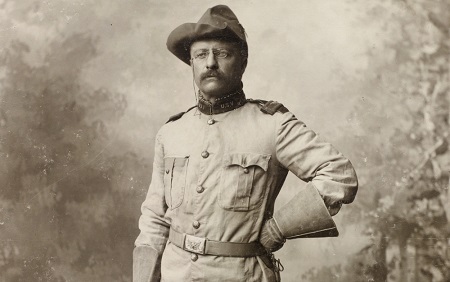Theodore Roosevelt of New York City, New York was the 26th president of the United States of America, serving from 1901 through 1909. A survey of his life was offered through the History Channel documentary Theodore Roosevelt (2022), airing in televised episodes originally airing, respectively, on May 30th and May 31st. Malcolm Venville directed the documentary.

The opening episode of the documentary, titled The Great Adventure, starts with an introduction of Roosevelt in his childhood as a sickly youngster struggling to fight his way through illness. We literally get a sense of the man taking comfort in physical activity based in affluence and an education that gave the man an appreciation the belied his station; that is, Roosevelt would take an appreciation of the disadvantaged into his sense of the world. Interestingly, the documentary shared an image of Roosevelt and his brother overlooking Abraham Lincoln‘s funeral train from Washington DC to Springfield, Illinois. Lincoln, the 16th president of the United States, had been assassinated in 1865.

The episode introduced us to much heartache for Roosevelt early in his life, including the deaths of his mother and wife, only hours apart on February 14, 1884. The young state legislator of New York had been in Albany, New York when summoned to New York City with the possibility of this news. Having also been away at school when his father died, Theodore Roosevelt as a younger man at the time, the spirit of a fighter through physical activity really summoned itself in this time. The reformer spirit of Roosevelt as the legislator, later as the New York City police commissioner, and an ability to rally public support with a streak of independence against the party ideals that he ran with, the notion of being Vice President of the United States had been a way for the party to quell this spirit led to the conclusion of the Roosevelt story, as told in The Great Adventure).

The Man in the Arena picks up from the point of William McKinley, the 25th president of the United States, having been shot to death at the 1901 World’s Fair (aka Pan-American Exposition) of Buffalo, New York. Roosevelt would assume the presidency with a philosophy of having those in power play by the rules. The education of Roosevelt in how to conduct this business of trust busting, extending the imperial ambitions of the United States with the Panama Canal, and negotiating his own assertion of power all were points of import for the story documented. The introduction of Roosevelt’s relationship with race was discussed through both episodes of the documentary, including specific interactions with notable leader on race, Booker T. Washington.

Theodore Roosevelt‘s service as president of the United States ended with the man being less than 50-years old. In addition to having renamed the executive mansion of the United States to the White House, the man found himself restless after ending his presidency. When presidential successor William Howard Taft took his single term in a direction not to Roosevelt‘s liking, the former president ran under the banner of a third party of Roosevelt‘s making in 1912. Roosevelt, notably giving a speech after having been shot in Milwaukee, Wisconsin, would place ahead of Taft in that election. That election, however, would be won by 28th president of the United States, Woodrow Wilson.

Many significant points of history for Theodore Roosevelt, the man, were introduced within this documentary. The measure of the man himself was addressed for being something that measured the appetite for reform with perceived pragmatics in having the basis for being able to apply it. That the man wasn’t perfect, while moving the dial forward in meaningful ways, feels like the larger message of this experience. I grant Theodore Roosevelt as directed by Malcolm Venville at 3.75-stars on a scale of 1-to-5.
Matt – Saturday, June 11, 2022








